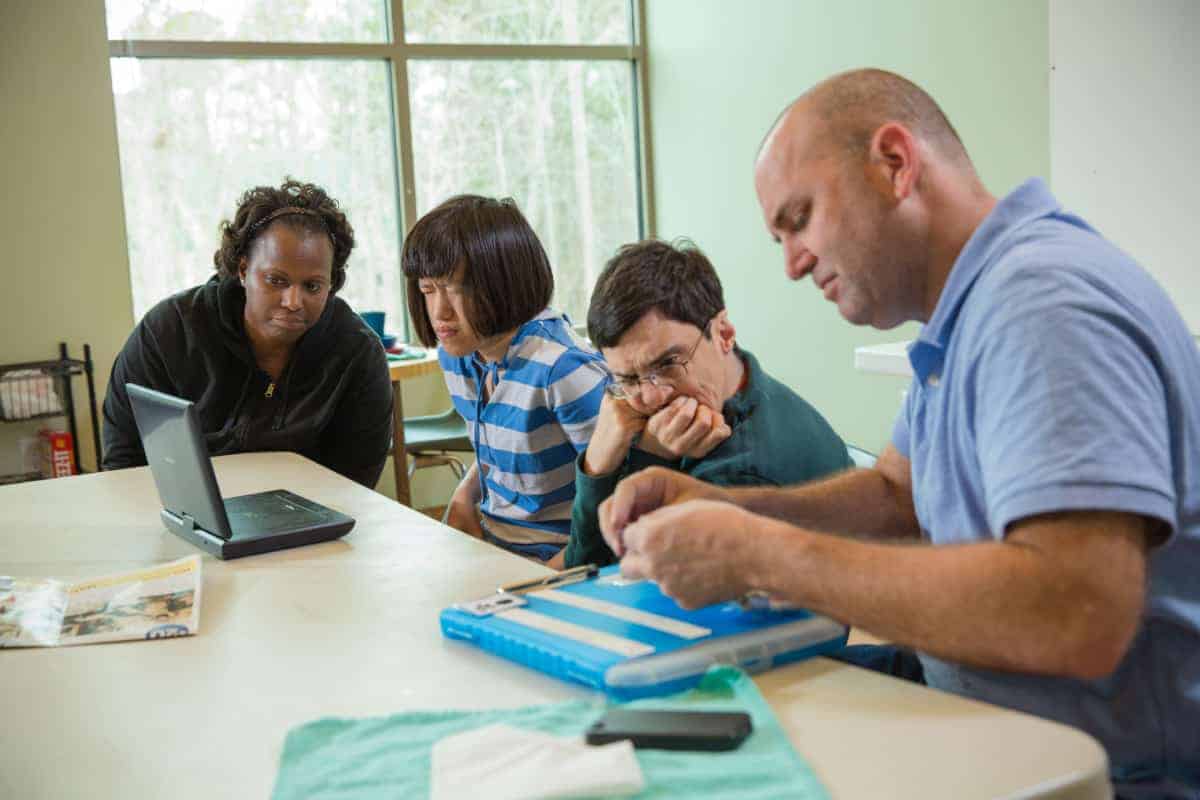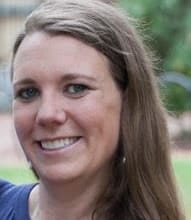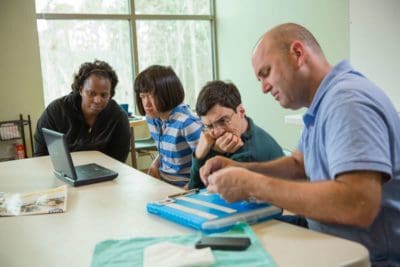When Adison Cole boarded a school bus recently and turned to say “bye-bye,” her grandmother felt tears welling up in her eyes.
Adison, a Moore County girl with autism, has essentially been nonverbal for her entire 12 years of life and long struggled to cope with her surroundings. She’s barely spoken in the three years she and her brothers have been in Donna Dworak’s care.


All of that’s changed in recent weeks with Adison asking to “eat,” saying she’s “all done,” and greeting her brothers with a “hey.”
Dworak credits the girl’s recent progress to a type of specialized, intensive behavioral therapy Adison began in late June after Dworak spent three years trying to get the local Medicaid behavioral health care provider, the Sandhills Center, to enroll Adison in the covered therapies.
“That’s why it is so worth fighting for,” said Dworak, about her granddaughter’s recent breakthroughs. “It’s just amazing what it’s done for her.”
A specialist from Fayetteville’s Community Connections now comes to Dworak’s home for 12 hours each week for applied behavior analysis(ABA) therapy, helping Adison use her communication device more and working to lessen the girl’s outbursts.
Adison and Dworak were featured in a May North Carolina Health News article about long delays families across the state face in getting ABA therapies through the seven regional state-funded mental health management agencies (known as LME/MCOs) paid by the state to provide Medicaid behavioral health services.
Following the NC Health News report about the waits for ABA therapies, the N.C. Department of Health and Human Services launched a statewide review into provider capacity, and whether others have been waitlisted for Medicaid services unbeknownst to DHHS officials.
No one on Medicaid should be waiting significant amounts of time for care, regardless of how hard it may be to find providers, said Dave Richard, the state DHHS deputy secretary who oversees the state’s $14 billion Medicaid program.
Richard called long waits for help “upsetting” in a recent interview. He met with LME/MCOs executives in late June and reiterated that the agencies are paid by the state to promptly provide covered services such as ABA therapies.
The therapies themselves are an evidence-based practice credited with helping many with autism better navigate their lives, with highly-trained therapists and technicians working one-on-one with individuals anywhere from 10 to 40 hours a week in their homes or at schools.
But many in North Carolina have faced significant barriers to accessing ABA therapies, as NC Health News reported this spring about delays in the Medicaid system and loopholes in a 2015 insurance mandate that’s left many in the state without access to insurance to pay for therapies that can cost upwards of $40,000 a year.
Only a fraction of health care plans fall under the state’s purview, with most plans offered falling under federal rules or are self-insured plans where employers pay for the claims made.
Nor can families buy their own health care plans in North Carolina to cover the costly therapies, with the legislature opting in 2015 to prevent open marketplace plans from including ABA therapy coverage. Adding the services would likely raise the prices of those plans, with other states experiencing increases of $3 to $6 per person for annual plans, according to information provided by Autism Speaks.
Shortage of analysts continues
Compounding the insurance access issue is a shortage of the highly trained therapists in North Carolina where an estimated one in every 57 children are diagnosed with the brain disorder which can include difficulties in communicating and social interactions.
Board Certified Behavior Analysts (BCBAs) have masters-level educations and are certified by a national board in order to practice. There are just 327 BCBAs in North Carolina, according to the Behavior Analyst Certification Board, and 812 registered behavior technicians that carry out the bulk of the day-to-day treatment.
But in North Carolina, the state’s psychology board has taken the position that state law requires BCBAs to be supervised by psychologists, a layer of oversight that many in the autism community feel contributes to the shortage of the specialized therapists.
But it’s not that the board or psychologists want to corner the market on ABA therapies, said Daniel Collins, the executive director of the N.C. Psychology Board.
The psychology board would like to see BCBAs operate on their own under a state board geared toward BCBAs. The specialized therapies are an important treatment option for many children with autism or intellectual disabilities, said Dr. Robert Hill, a Boone psychologist who chairs the state board.
But the N.C. General Assembly has declined to create a new board for BCBAs in the state, in line with a larger effort the Republican leadership has undertaken in recent years to reduce and limit the number of professional licensing boards in the state.
“It’s frustrating to me that the state legislature has not acted on this,” Hill said.
Until or if they do, Hill said the psychology board has no option but to require oversight.
Waits continue for help
Lisa Nesbitt, an attorney with Disability Rights NC, remains skeptical of claims that provider shortages are solely driving the delays.
Instead, she thinks LME/MCOs have been slow to respond to a need they know is there in large part because of the high expense in delivering ABA therapies.
Caregivers on limited incomes, and already stretched from caring for someone with significant disabilities, simply don’t have the ability to navigate an overly complicated system, she said.
“They give up,” she said. “Who has the time and the resources to deal with that?”


Sandhills now has 22 people waiting for ABA therapies in a nine-county area and 23 people receiving help, according to Anthony Ward, Sandhills’ chief operating officer. That’s a sharp increase from March when NC Health News first asked about the services and was told that 13 people were receiving therapies and no one was waiting for help.
The agency found out then that its sole provider was keeping a waiting list and has since added another provider to its network. Sandhills has agreements with two others to take on individual cases, but is still in need of more providers. Ward hopes the statewide review helps identify new providers.
Kayla Ingram, a 6-year-old girl with autism from Rockingham in Richmond County, is one of those on Medicaid waiting for help from the Sandhills network.


Kayla’s autism has left her non-verbal, and she tends to cope with any anxiety with physical outbursts that put herself in harm’s way and prevent her parents from taking her out in public very often. Every doctor and behavior specialist they’ve seen have said Kayla would benefit enormously from ABA therapies, but her mother Megan Ingram can’t find a Medicaid provider in her area to serve them despite months of asking.
“It’s really depressing and discouraging,” Ingram said.
She called Community Connections, one of the Sandhills providers, eight months ago to ask about availability. She has yet to hear back despite checking on her request multiple times.
Her mother hopes that if Kayla and others like her get access to early intervention services, their later years will be easier.
“They might be able to function somewhat normally,” Ingram said.
Editor’s note: This article was first published by NC Health News. It has been posted with the author’s permission.



